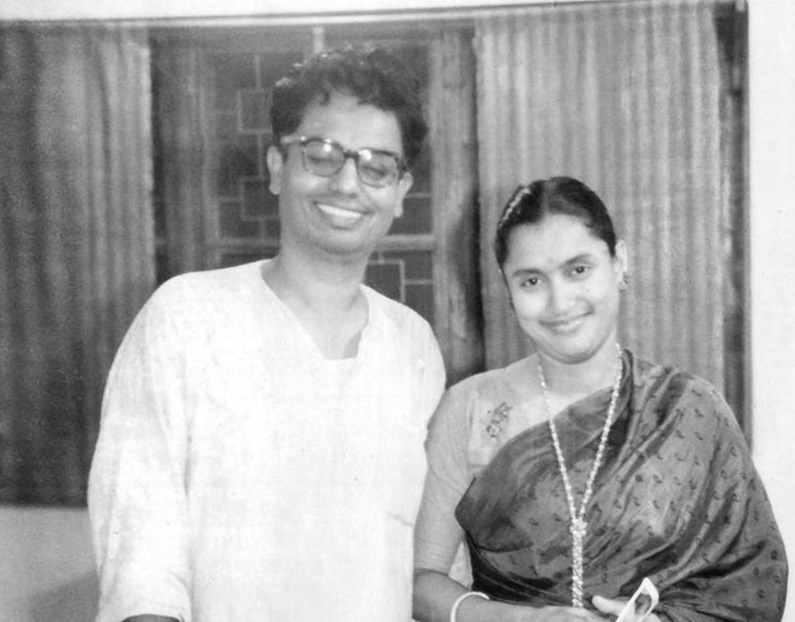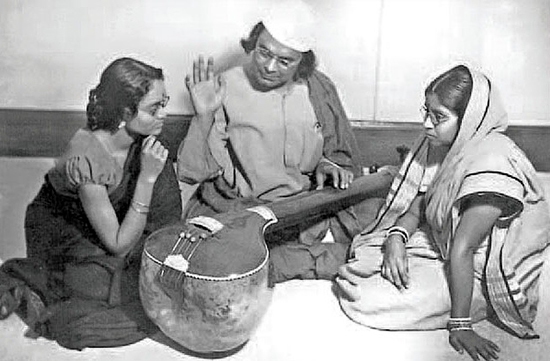|
Sangskriti Sangsad
Sanskriti Sangsad was a cultural organization of Dhaka University. It was renamed to Dhaka Vishwavidyalay Sangskriti Sangsad during its lifetime. History Sanskriti Sangsad was established in as left-wing secular cultural organization inspired by the Bolshevik revolution in Russia. It was founded by Anwarul Azim, Hasan Hafizur Rahman, Khan Sarwar Murshid, Munier Choudhury, and Obaidullah Khan. Khan Sarwar Murshid was the founding President and the founding General Secretary Mustafa Nurul Islam. On 4 September 1951, the organization presented its debut play, an adaption of ''Jabanbandi'' by Bijon Bhattacharya. This was the first play in Dhaka University to have female students perform in it. Aside from holding plays it hosted literary conferences and discussions. It help programs marking the birthdays of famous Bengali writers such as Kazi Nazrul Islam, Rabindranath Tagore, and Sukanta Bhattacharya Sukanta Bhattacharya ( bn, সুকান্ত ভট্টাচার্য) ( ... [...More Info...] [...Related Items...] OR: [Wikipedia] [Google] [Baidu] |
Hasan Hafizur Rahman
Hasan Hafizur Rahman (;1932–1983) became the editor of the ''Daily Bangla'' right after the Bangladesh Liberation War in 1971. He also worked for the government as a high official and edited an account of the independence struggle called ''The Liberation War of Bangladesh'', which was published in sixteen volumes. He was the author of thirteen books including eight collections of poetry and ''Adhunik Kobi O Kobita'' (''Modern Poets and Poetry''), a book of critical essays. Awards * Adamjee Literary Award (1967) * Bangla Academy Literary Award (1971) * Ekushey Padak Ekushey Padak ( bn, একুশে পদক; lit. "Twentyfirst Award") is the second highest civilian award in Bangladesh, introduced in memory of the martyrs of the Bengali Language Movement of 1952. The award is given to recognize contribut ... (!984) References 1932 births 1983 deaths Bengali writers Recipients of the Independence Day Award Bangladeshi male writers Recipients of the Adamjee Literary ... [...More Info...] [...Related Items...] OR: [Wikipedia] [Google] [Baidu] |
Khan Sarwar Murshid
Khan Sarwar Murshid ( bn, খাঁন সারওয়ার মুরশিদ; 1 July 1924 – 8 December 2012) was a Bangladeshi educationist, diplomat and intellectual. Early life and education Sarwar Murshid was born on 1 July 1924 in his maternal home, the Munsef Bari of Comilla in Tipperah District, Bengal Province. He belonged to a Bengali Muslim family of Khans hailing from the village of Nasirabad in Nabinagar, Brahmanbaria. His father, Ali Ahmed Khan, was an advocate and All-India Muslim League politician, and served as a member in both the Bengal Legislative Assembly and the East Pakistan Provincial Assembly. Murshid was raised largely in Brahmanbaria town. After completing his primary education at home, he enrolled at the George High School in Brahmanbaria from where he passed his matriculation in 1939. Murshid then proceeded to complete his FA from Feni Government College. He then moved on to study at the Comilla Victoria Government College, and then ... [...More Info...] [...Related Items...] OR: [Wikipedia] [Google] [Baidu] |
Munier Choudhury
Munier Choudhury (27 November 192514 December 1971) was a Bangladeshi educationist, playwright, literary critic and political dissident. He was a victim of the 1971 killing of Bengali intellectuals, mass killing of Bangladeshi intellectuals in 1971. He was awarded Independence Day Award in 1980, by the then president Ziaur Rahman's government, posthumously. Early life and education Choudhury's ancestors were originated from Noakhali. He was born on 27 November 1925 in Manikganj. His father was Khan Bahadur Abdul Halim Chowdhury, a district magistrate and Aligarh Muslim University graduate. His mother was Umme Kabir Afia Begum (d. 2000). Because of his father's official assignment, Choudhury lived in Manikganj, Pirojpur and other parts of East Bengal. The family moved to Dhaka permanently in 1936. Then he grew up in the residence ''Darul Afia'', named after her mother, among 14 siblings. He completed his matriculation from Dhaka Collegiate School in 1941 and intermediate examinat ... [...More Info...] [...Related Items...] OR: [Wikipedia] [Google] [Baidu] |
Mustafa Nur-Ul Islam
Mustafa Nur-Ul Islam (1 May 1927 – 9 May 2018) was a Bangladeshi academic. In 2011, he was appointed a National Professor of Bangladesh. He was awarded Ekushey Padak in 1981 and Independence Day Award in 2010 by the Government of Bangladesh. He was the founder director of Bangladesh Shilpakala Academy, the Director General of Bangla Academy and the Chairman of Bangladesh National Museum. In 2011, he was appointed a National Professor. He edited a literary magazine named ''Sundaram''. Early life Islam was born on 1 May 1927 to the writer Sadat Ali Akhand and Rabeya Khatun in the village of Chingashpur, adjacent to Mahasthangarh in Bogra District. Education and career Islam graduated from the University of Calcutta in 1948 and got his post-graduate degree from the University of Dhaka and PhD from the London University. He started the career in journalism in 1951. In his career, he taught at St. Gregor's and Edward College under University of Rajshahi and Jahangirnagar Universit ... [...More Info...] [...Related Items...] OR: [Wikipedia] [Google] [Baidu] |
Bijon Bhattacharya
Bijon Bhattacharya ( bn, বিজন ভট্টাচার্য; 17 July 1906 – 19 January 1978) was an Indian theatre and film actor from West Bengal. He was an eminent playwright and dramatist. Bhattacharya was born in 1906 at Faridpur (now in Bangladesh) to a Hindu, Bengali Brahmin family, and was an early witness to the destitution and penury of the peasantry of that land. He became a member of the Indian People's Theatre Association (IPTA). Personal life Bijon Bhattacharya married the Jnanpith Award-winning Bengali writer, Mahasweta Devi. Their only son Nabarun Bhattacharya, a Bengali writer, was born in 1948. Works Dramas * ''Agun'' * ''Nabanna'' (Fresh Harvest) (1944) * ''Jabanbandi'' (Confession) * ''Kalanka'' * ''Mara Chand'' (Dead Moon) (1951) * ''Gotrantar'' (Change of Lineage) (1959) * ''Debi Garjan'' (Shouting of the Goddess) (1966) * ''Garbhabati Janani'' (Pregnant Mother) (1969) * ''Krishnapaksha'' * ''Aj Basanta'' * ''Chalo Sagare'' * ''Lash Ghuirya ... [...More Info...] [...Related Items...] OR: [Wikipedia] [Google] [Baidu] |
Kazi Nazrul Islam
Kazi Nazrul Islam ( bn, কাজী নজরুল ইসলাম, ; 24 May 1899 – 29 August 1976) was a Bengali poet, Bengali literature, writer, Bangladeshi music, musician, and is the national poet of Bangladesh. Nazrul is regarded as one of the greatest poets in Bengali literature. Popularly known as Nazrul, he produced a Complete Works of Kazi Nazrul Islam, large body of poetry, music, messages, novels, stories, etc. with themes that included equality, justice, anti-imperialism, humanity, rebellion against oppression and religious devotion. Nazrul's activism for political and social justice as well as writing a poem titled as "Bidrohī", meaning "the rebel" in Bengali, earned him the title of "Bidrohī Kôbi" (''Rebel Poet''). His compositions form the avant-garde music genre of Nazrul Geeti, Nazrul Gīti (''Music of Nazrul''). Born into a Bengali Muslim Qadi#IndoPak Region, Kazi family hailing from Bardhaman district, Burdwan district in Bengal Presidency (now in West Be ... [...More Info...] [...Related Items...] OR: [Wikipedia] [Google] [Baidu] |
Rabindranath Tagore
Rabindranath Tagore (; bn, রবীন্দ্রনাথ ঠাকুর; 7 May 1861 – 7 August 1941) was a Bengali polymath who worked as a poet, writer, playwright, composer, philosopher, social reformer and painter. He reshaped Bengali literature and music as well as Indian art with Contextual Modernism in the late 19th and early 20th centuries. Author of the "profoundly sensitive, fresh and beautiful" poetry of ''Gitanjali'', he became in 1913 the first non-European and the first lyricist to win the Nobel Prize in Literature. Tagore's poetic songs were viewed as spiritual and mercurial; however, his "elegant prose and magical poetry" remain largely unknown outside Bengal. He was a fellow of the Royal Asiatic Society. Referred to as "the Bard of Bengal", Tagore was known by sobriquets: Gurudev, Kobiguru, Biswakobi. A Bengali Brahmin from Calcutta with ancestral gentry roots in Burdwan district* * * and Jessore, Tagore wrote poetry as an eight-yea ... [...More Info...] [...Related Items...] OR: [Wikipedia] [Google] [Baidu] |
Sukanta Bhattacharya
Sukanta Bhattacharya ( bn, সুকান্ত ভট্টাচার্য) (; 15 August 1926 – 13 May 1947) was a Bengali poet and playwright. He was called 'Young Nazrul' and 'Kishore Bidrohi Kobi', a reference to the great rebel poet Kazi Nazrul Islam for Sukanta's similar rebellious stance against the tyranny of the British Raj and the oppression by the social elites through the work of his poetry. He died from tuberculosis, three months before India achieved independence. Works As a poet as well as a Marxist he wielded his pen against the Second World War, the famine of 1943, fascist aggression, communal riots etc. His poems, which describe the sufferings of the common people and their struggle for existence, look forward to an exploitation-free society. His poetry books are: * ''Chharpatra'' (ছাড়পত্র) (1948) * ''Ghum Nei'' (ঘুম নেই) (1950) * ''Purbabhas'' (পূর্বাভাস) (1950) * ''Abhijan'' (অভিযান) (1953) * ... [...More Info...] [...Related Items...] OR: [Wikipedia] [Google] [Baidu] |
1951 Establishments In East Bengal
Events January * January 4 – Korean War: Third Battle of Seoul – Chinese and North Korean forces capture Seoul for the second time (having lost the Second Battle of Seoul in September 1950). * January 9 – The Government of the United Kingdom announces abandonment of the Tanganyika groundnut scheme for the cultivation of peanuts in the Tanganyika Territory, with the writing off of £36.5M debt. * January 15 – In a court in West Germany, Ilse Koch, The "Witch of Buchenwald", wife of the commandant of the Buchenwald concentration camp, is sentenced to life imprisonment. * January 20 – Winter of Terror: Avalanches in the Alps kill 240 and bury 45,000 for a time, in Switzerland, Austria and Italy. * January 21 – Mount Lamington in Papua New Guinea 1951 eruption of Mount Lamington, erupts catastrophically, killing nearly 3,000 people and causing great devastation in Oro Province. * January 25 – Dutch author Anne de Vries releases the first volume of his children's nove ... [...More Info...] [...Related Items...] OR: [Wikipedia] [Google] [Baidu] |





